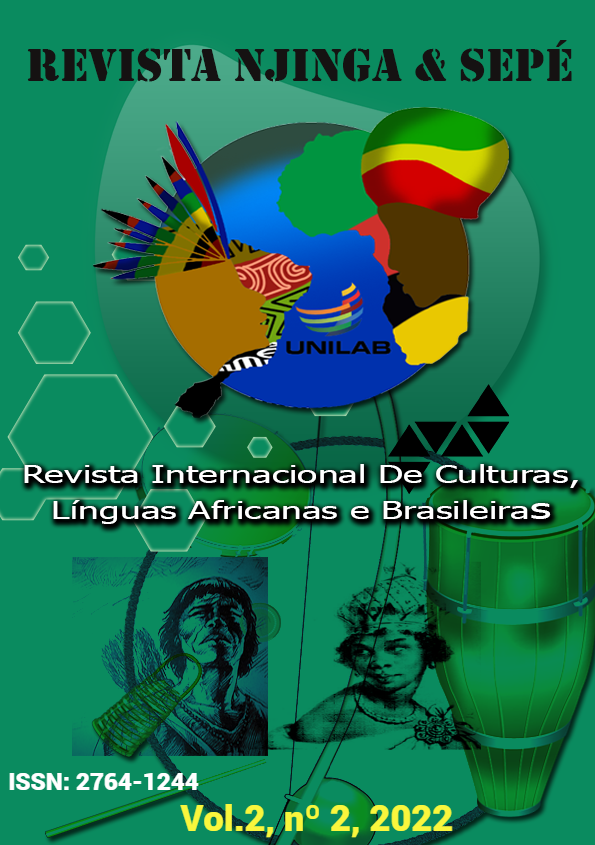6.O uso da dêixis pessoal como marcador de respeito: o caso do Changana, língua transfronteiriça
Kutirhisiwa ka deksisi ya vanhu tani xikombiso xa xichavu, hi Xichangana, ririmi leritsemakanyaka mindzelekanu
Keywords:
Respeito, Dêixis Pessoal, Dêixis Social, Changana, TsongaAbstract
Todas as sociedades humanas possuem meios linguísticos para expressar ou demonstrar respeito uns aos outros. O presente estudo tem como objectivo explorar as diferenças e semelhanças entre o Changana falado em Moçambique e o falado na África do Sul no concernente ao uso da dêixis pessoal como marcador de respeito, porém, tomando como base dados obtidos em material escrito. Na África do Sul, o Changana tem a designação de Tsonga. Partimos do pressuposto de que no Changana, por ser uma língua transfronteiriça, pode haver diferenças na forma como os seus falantes manuseiam as expressões deícticas pessoais para expressarem respeito na comunicação ‑ dêixis social. Estamos na esteira de Crystal (1997) quando advoga que em todas as línguas do mundo há estratégias de marcação do respeito e o que é distintivo é a maneira pela qual as diferenças de níveis sociais dos falantes estão codificadas na gramática e no léxico de cada língua em particular. Os dados analisados comparativamente foram extraídos de duas novelas changanas, uma moçambicana e outra sul-africana. Estes dados revelaram que, entre as duas comunidades, há um uso díspar dos marcadores de respeito, havendo contextos em que as duas manifestam as mesmas características. Desta forma, conclui-se que o leque de dispositivos que os membros destas comunidades descritas nas duas obras analisadas empregam na expressão de respeito e cortesia advêm da apreciação das relações sociais que eles estabelecem entre si, dos papéis sociais que estes desempenham, da idade e do género.
***
Nkomiso: Hinkwatu tindzimi ti ni tindlela leti vanhu, akuhanyisaneni ka vona, vakombaka kumbe vakombisanaka ha tona xichavu. Jondzo leyi yi ni nkongometo wa kuxopaxopa kuhambana ni kufanana xikarhi ka Xichangana xa Musambiki ni xa Afrika-Dzonga ka lesvifambelanaka ni matirhisela ya deksisi ya vanhu (dêixis pessoal) tani xikombiso xa xichavu, kambe na yitiseketela hi svitiviwa lesvikumiweke ka svitsalwana. Le Afrika-Dzonga, Xichangana xivuliwa Xitsonga. Hisusumetiwa hi nkumbetelo wa lesvaku, lesvi Xichangana xitsemakanyaka mindzelekanu ya matiko lawo, kungahava ni kuhambana hi tlhelo ra lesvi vavuvavuli va xona vatirhisisaka xisvona marito ya deksisi ya vanhu akuva vakombisa xichavu akukanelisaneni ka vona ‑ deksisi ya mahanyisanela (dêixis social). Hilandza ntila wa Crystal (1997) loko atiyisa lesvaku ka tindzimi hinkwatu ta misava ku ni tindlela ta kukombisa xichavu na akuhambana kakona ku li ka ndlela leyi amatshamela ni sviyimu sva vanhu svikombisiwaka hakona hi milawu ya mavulavulela ni hi marito ya ririmi rin’wana ni rin’wana. Asvitiviwa lesvingatakambisisiwa svitshahiwe ka tinovhela timbirhi ta Xichangana, yin’we ya Musambiki, yin’wana ya Afrika-Dzonga. Asvitiviwa lesvi svidlunyata lesvaku, ka matiko lamambirhi, ku ni kuhambana ka matirhisela ya svikombiso sva xichavu, hambiloko ka matshamela man’wana matshuka mafanana. Hi mukhuva lowu, kufikiwa akutwisiseni ka lesvaku atindlela letihlamuseliwaka ka svitsalwana lesvimbirhi leti vanhu vatitirhisaka akukombiseni ka xichavu ni malwandla tivangiwa hilaha vapimanaka hakona sviyimu sva vona, hi lesvi vanga svona tikweni, hi tintanga ta vona ni hi rimbewu.
Downloads
References
BENVENISTE, É. Problemas de Linguística Geral. Paris: Gallimard, 1966.
BHAT, D. N. S. Pronouns. Oxford studies in typology and linguistic theory. Oxford: Oxford University Press, 2004.
BUHLER, K. Sprachtheorie: Die Darstellungsfunktion der Sprache. Jena: Fischer, 1934.
CAVALCANTE, M. M. Expressões indiciais em contexto de uso: por uma caracterização dos deícticos discursivos. Dissertação de Mestrado. Programa de Pós-Graduação em letras e Linguística, UFPE, 2000.
CRYSTAL, D. The Cambridge Encyclopediaof Language. Cambridge: Cambridge Universtity Press, 1997.
CUMBANE, R. Expressões deícticas espaciais em Changana. (Dissertação de Mestrado não publicada). Maputo: UEM-FLCS, 2017.
CYSOUW, M. The paradigmatic structure of person marking. (Oxford studies in typology and linguistic theory). Oxford: Oxford University Press, 2003.
FONSECA, F. Deixis, tempo e narração. Porto: Fundação Eng. António de Almeida, 1992.
HYMES, D. The ethnography of speaking: In: GLADWIN, T; STURTEVANT, W. (Eds). Anthropology and Human Behaviour. Washington, DC: Anthropological Society of Washington. Readings in the Sociology of Language. The Hague: Mouton, 1968. p. 13-53.
LENZ, F. Deictic Conceptualisation of Space, Time and Person (eds.) Speech, place and action: studies in deixis and related topics. New York: John Wiley and Sons, 1956.
LEVINSON, S. C. Pragmática. São Paulo: Martins Fontes, 2007.
LYONS, J. Semantics. Vol. II. Cambridge: Cambridge Universtity Press, 1977.
MAALEJ, Z. A. Framing and manipulation of person deixis in Hosni Mubarak’s last three speeches: a cognitive-pragmatic approach. Pragmatics, 2013. p. 633-659.
MARMARIDOU, S. Pragmatic Meaning and Cognition. Amsterdam, Philadelphia: John Benjamins Publishing Company, 2000.
MATHEBULA, M. 800 Years of Tsonga History (Year 1200 - Year 2000). Burgersfort: Sasavona, 2013.
MITI, L. Comparative Bantu Phonology and Morphology. Cape Town:The Centre for Advanced Studies of African Society (CASAS), 2006.
MNISI, H. S. Ntukulu wanga Yedwa. Braamfontein: Sasavona, 1977.
SITOE, B. Thandhavantu. Maputo: Editores Associados, Lda, 1995.
_______. Verbs of Motion in Changana. Leiden: Research School CNWS, Universiteit Leiden. The Netherlands, 2001.
_______. Dicionário Changana-Português. 2.ed. Maputo: Texto Editores, 2011.
Downloads
Published
How to Cite
Issue
Section
License
Copyright (c) 2022 NJINGA&SEPÉ: Revista Internacional de Culturas, Línguas Africanas e Brasileiras

This work is licensed under a Creative Commons Attribution-NonCommercial-NoDerivatives 4.0 International License.
Authors who publish in this journal agree to the following terms:
Authors maintain copyright and grant the journal the right to first publication, the work being simultaneously licensed under the Creative Commons Attribution License, which allows the sharing of the work with recognition of the authorship of the work and initial publication in this magazine.
Authors are authorized to assume additional contracts separately, for non-exclusive distribution of the version of the work published in this journal (eg, publishing in institutional repository or as a book chapter), with acknowledgment of authorship and initial publication in this journal.
Authors are permitted and encouraged to publish and distribute their work online (eg in institutional repositories or on their personal page) at any point before or during the editorial process, as this can generate productive changes, as well as increase impact and citation of the published work (See The Effect of Open Access).




